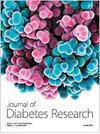补充维生素 D 对 2 型糖尿病患者血糖控制和心血管风险因素的影响:临床试验的最新系统回顾和元分析》。
IF 3.6
3区 医学
Q2 ENDOCRINOLOGY & METABOLISM
引用次数: 0
摘要
背景和目的:本荟萃分析旨在研究维生素 D 补充剂对 2 型糖尿病(T2DM)患者血红蛋白 A1C(HbA1C)、空腹血糖(FBS)、低密度脂蛋白(LDL)、高密度脂蛋白(HDL)、收缩压(SBP)和总维生素 D 水平的影响。研究方法使用相关关键词在 PubMed (Medline)、Scopus、Embase、Web of Science、Cochrane Library 和 ClinicalTrials.gov 等数据库中进行了系统检索,检索时间为 1990 年 1 月至 2024 年 1 月。在筛选和提取数据后,使用 Cochrane 随机试验偏倚风险工具 (RoB 2) 对文章进行了定性评估。结果研究结果显示,补充维生素 D 可显著降低平均 HbA1C(SMD:-0.15;95% CI:-0.29,-0.20;I square:79.76%;P 值<0.001)和平均 FBS(SMD:-0.28;95% CI:-0.40,-0.15;I平方:70.13%;P值<0.001),降低SBP(SMD:-0.06;95% CI:-0.16,-0.05;I平方:39.63%;P值=0.23),降低LDL(SMD:-0.11;95% CI:-0.28,-0.05;I平方:73.66%;P值<0.001)。此外,补充维生素 D 可提高 T2DM 患者的平均 HDL(SMD:0.13;95% CI:0.04,0.29;I square:79.33%;P 值<0.001)和维生素 D 水平(SMD:1.78;95% CI:1.53,2.04;I square:91.92%;P 值<0.001)。亚组分析表明,体重增加、体重指数和病程会降低维生素 D 补充剂对糖尿病患者糖尿病控制的影响。结论结果还表明,补充 50,000 IU 的维生素 D 对降低与糖尿病控制有关的指标有显著效果。根据综合证据,这项荟萃分析的结果表明,补充维生素 D 可显著改善血糖控制,降低 T2DM 相关并发症的风险,尤其是心血管疾病(CVDs)。本文章由计算机程序翻译,如有差异,请以英文原文为准。
The Effect of Vitamin D Supplementation on Glycemic Control and Cardiovascular Risk Factors in Type 2 Diabetes: An Updated Systematic Review and Meta-Analysis of Clinical Trials.
Background and Aims: The purpose of this meta-analysis was to investigate the effect of vitamin D supplementation on hemoglobin A1C (HbA1C), fasting blood sugar (FBS), low-density lipoprotein (LDL), high-density lipoprotein (HDL), systolic blood pressure (SBP), and the total vitamin D level in patients with Type 2 diabetes (T2DM). Methods: A systematic search was conducted in databases such as PubMed (Medline), Scopus, Embase, Web of Science, Cochrane Library, and ClinicalTrials.gov using relevant keywords from January 1990 to January 2024. After screening and extracting data, a qualitative evaluation of articles was performed using the Cochrane risk-of-bias tool for randomized trials (RoB 2). Results: The findings revealed that vitamin D supplementation significantly decreased the mean HbA1C (SMD: -0.15; 95% CI: -0.29, -0.20; I square: 79.76%; p value < 0.001) and mean FBS (SMD: -0.28; 95% CI: -0.40, -0.15; I square: 70.13%; p value < 0.001), lowered SBP (SMD: -0.06; 95% CI: -0.16, -0.05; I square: 39.63%; p value = 0.23), and reduced LDL (SMD: -0.11; 95% CI: -0.28, -0.05; I square: 73.66%; p value < 0.001). Furthermore, vitamin D supplementation increased the average HDL (SMD: 0.13; 95% CI: 0.04, 0.29; I square: 79.33%; p value < 0.001) and vitamin D levels (SMD: 1.78; 95% CI: 1.53, 2.04; I square: 91.92%; p value < 0.001) in patients with T2DM. Subgroup analyses showed that weight gain, BMI, and duration of the disease could reduce the effect of vitamin D supplementation on diabetes control in affected patients. Conclusion: The results also indicated that taking vitamin D supplements in the amount of 50,000 IU had a significant effect on reducing the indicators related to diabetes control. Based on the combined evidence, the findings of this meta-analysis suggest that vitamin D supplementation can significantly improve glycemic control and reduce the risk of complications associated with T2DM, especially cardiovascular diseases (CVDs).
求助全文
通过发布文献求助,成功后即可免费获取论文全文。
去求助
来源期刊

Journal of Diabetes Research
ENDOCRINOLOGY & METABOLISM-MEDICINE, RESEARCH & EXPERIMENTAL
CiteScore
8.40
自引率
2.30%
发文量
152
审稿时长
14 weeks
期刊介绍:
Journal of Diabetes Research is a peer-reviewed, Open Access journal that publishes research articles, review articles, and clinical studies related to type 1 and type 2 diabetes. The journal welcomes submissions focusing on the epidemiology, etiology, pathogenesis, management, and prevention of diabetes, as well as associated complications, such as diabetic retinopathy, neuropathy and nephropathy.
 求助内容:
求助内容: 应助结果提醒方式:
应助结果提醒方式:


